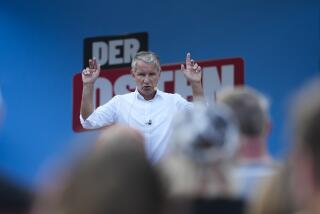East, West Radicals Find Unsettling Bond
BERLIN — BERLIN -- They are unlikely allies, but right-wing extremists and Islamic militants share a hatred for Israel and the United States that has drawn the attention of German authorities.
Since 2001, when Islamic extremists and neo-Nazis cheered the Sept. 11 terrorist attacks on the U.S., the two camps have echoed one another’s abhorrence of what they view as a world controlled by Jews and enforced by Washington’s military power. There are no links suggesting that right-wing and Islamic groups are collaborating on terrorism-related strategies, but law enforcement officials are concerned over the growing, and sometimes surreal, attraction between the two.
“The common ground they share is deep on two issues,” said one Western diplomat. “They cannot tolerate the existence of Israel, and they share a conspiracy theory that the U.S. wants to control the Middle East and the world’s energy supply. It’s a very paranoid world view, but they share it deeply.”
Though extremists in both camps have been eyeing each other for decades, many are skeptical that such an alliance can advance very far, given broad religious and philosophical differences and the strong racism among right-wing extremists. Neo-Nazis and skinheads historically have attacked immigrant Muslims and other foreigners for spoiling their dream of a pure German state. The street-level thugs of the right wing, according to some officials, will not easily abandon anti-foreigner sentiments in favor of joining Islamists in a campaign of violence against the U.S. and Israel.
“Right-wing extremists are so xenophobic that we can’t imagine a deep structural connection between these groups,” said Isabelle Kalbitzer, a spokeswoman for Berlin’s Office for the Protection of the Constitution, which prosecutes offenses against the state. “But we are keeping a close eye on this.”
Although neo-Nazi shock troops may not be embracing their Islamic counterparts, right-wing leaders and ideologues have come to admire the tenacity of Muslim militants. This was heightened after the Sept. 11 attacks, when right-wing extremists were awed by the Al Qaeda network’s dedication and patient planning in striking the icons of American capitalism and military prowess.
“Islamic militants are strange heroes for the right wing,” said Herbert Mueller, a government analyst of political extremism in Baden-Wuerttemberg state. “The right wing detests Islam, but that kind of commitment shows what they are lacking.”
Udo Voigt, chairman of Germany’s main far-right political force, the National Democratic Party, surprised the mostly Muslim audience in a university lecture hall late last year when he attended a speech by Shakir Aasim, a representative of Hizb ut-Tahrir, an Islamic organization branded dangerous by German authorities. Voigt also supports Ahmed Huber, a Swiss far-right leader who espouses closer ties with Muslim radicals and is under investigation by U.S. authorities for possible financial links to Al Qaeda.
In what was interpreted as a gesture of goodwill, Voigt was quoted by German television as telling the university crowd, “I think I speak in the name of all German nationalists when I say, if it comes to a great clash [between civilizations], we will not stand at the side of America.”
Aasim said he was unaware Voigt was in attendance. “I was astonished,” he said. “I didn’t know who he was until someone told me.” Aasim, whose group is being investigated by Germany for alleged ties to terrorist networks, said he doubts right-wing and Islamic movements will merge, adding, “We have very different ideas.”
But there is evidence of attraction between the radical views of East and West. Islamic fashion has even added a dash of color to the drab skinhead uniform of high boots and jeans. Neo-Nazis have been appearing at German rallies wearing Palestinian scarves and calling for worldwide intifada.
And last summer, members of the far-right fringe group Fighting Union of German Socialists attended a ceremony at the Iraqi Embassy in Berlin to receive an award from Saddam Hussein’s regime. “For us,” a member of the group, Tomas Behl, was quoted as saying, “Iraq is of special importance because in Saddam Hussein there is a person who reminds us of our leader, Adolf Hitler, who is standing up against superpower America and who is not willing to bend his knees.”
Groups such as the Fighting Union of German Socialists are considered absurd by law enforcement and intelligence officials. But more mainstream right-wing leaders, such as Austria’s Joerg Haider, the unofficial head of the Freedom Party, have made overtures to the radical Arab world. Haider visited Libya and Iraq several times in recent years. One of the most troubling figures on the far right is Huber, a Swiss businessman who travels throughout Europe and the U.S. promoting his radical views.
Huber converted to Islam in the 1960s. He denies that the Holocaust happened, and he supports jihad, or Islamic holy struggle. He was a member of the board of Nada Management, a financial services subsidiary of the international Al Taqwa group. U.S. law enforcement agencies allege that Al Taqwa served as a financial advisor to Osama bin Laden. Huber, who could not be reached, has said that the Sept. 11 attacks signified a war against “Satan’s symbols.”
Huber told the media that he met members of Bin Laden’s network and found them “very discreet, well educated, very intelligent people.” Huber has denied any wrongdoing and has stated that Nada has no ties to terrorist organizations.
The Sept. 11 attacks reaffirmed the common hatreds that kept right-wing extremists and Islamic radicals involved with each other for decades. Hitler entertained the mufti of Jerusalem, Haj Amin al-Husseini, in the 1940s because of their mutual hatred for Jews. During the 1991 Persian Gulf War, neo-Nazis attempted to form a contingent to fight alongside the Iraqis.
William L. Pierce, the late American novelist who wrote “The Turner Diaries,” which is considered defining literature for far-right groups, was invited to speak at a 1997 conference in Beirut rejecting the Holocaust. Other proposed speakers included members of Hezbollah and Horst Mahler, a left-wing militant turned far-right ideologue and member of Germany’s National Democratic Party.
The Lebanese government canceled the event.
In a recent interview, Mahler’s comments on Jews and the United States’ strength around the world sounded similar to extremists in the Middle East. He said Jews control the world’s money and business and are an invisible power operating behind globalization and protected by American imperialism. “The U.S. wants to mix up Europe, to destabilize European powers so there couldn’t be any opponent in dominating the world,” Mahler said. “And, therefore, the center of Europe is Germany and Germany must perish.... I see them as enemies.”
Despite shared sentiments, right-wing extremist and Islamic groups are too suspicious of one another to unite as a significant terrorist threat, according to many law enforcement officials and experts on extremism. The National Democratic Party, for example, supports the radical Muslim derision of Jews, but the party also wants to deport Germany’s predominantly Muslim population of 2 million Turks. Neo-Nazi violence continues against Muslims.
“For the neo-Nazis on the street, their common enemy with Islamic militants is not enough for them to suspend their anti-Islamic racism,” said Alfred Schobert, an analyst at the Information Service Against Right-Wing Extremism. “They wear the Palestinian scarf as a point of identification with Palestinian fighters in Israel. That’s OK, so long as the Palestinians live there and not in Germany.
“You can’t love the Arabs just because they hate the Jews too.... Still, one has to be concerned about it.”
More to Read
Sign up for Essential California
The most important California stories and recommendations in your inbox every morning.
You may occasionally receive promotional content from the Los Angeles Times.











